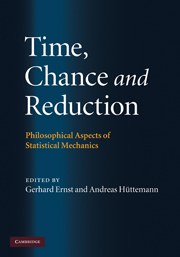Book contents
7 - Humean metaphysics versus a metaphysics of powers
from Part II - Probability and chance
Published online by Cambridge University Press: 04 August 2010
Summary
Humean metaphysics
Whereas the philosophy of science was dominated in the second half of the twentieth century by epistemological issues raised in the context of logical empiricism and its critics, the project of a metaphysics of Nature (metaphysics of science) has been rehabilitated recently. One can broadly distinguish three positions within that project: a Humean metaphysics that is close to empiricism (e.g. David Lewis, Barry Loewer and Helen Beebee), a metaphysics of universals (e.g. David Armstrong) and a metaphysics of powers (e.g. Sydney Shoemaker, Alexander Bird, Stephen Mumford as well as Charles Martin and John Heil). This chapter is about the opposition between the first and the third of these positions. I shall first outline the Humean view on properties, laws, causation and probabilities, and point out how on the one hand this view is parsimonious, whereas on the other hand it provokes the objection that it is deficient (this section). I shall explain how the metaphysics of powers seeks to remedy these deficiencies and consider its view of probabilities (Section 7.2). The chapter then recalls the standard argument against the conception of properties in Humean metaphysics, goes into arguments from physics and finally maintains that the metaphysics of powers, in contrast to Humean metaphysics, is able to do justice to both the ontological commitments of physics and of the special sciences (Section 7.3).
Information
- Type
- Chapter
- Information
- Time, Chance, and ReductionPhilosophical Aspects of Statistical Mechanics, pp. 119 - 136Publisher: Cambridge University PressPrint publication year: 2010
References
Accessibility standard: Unknown
Why this information is here
This section outlines the accessibility features of this content - including support for screen readers, full keyboard navigation and high-contrast display options. This may not be relevant for you.Accessibility Information
- 2
- Cited by
